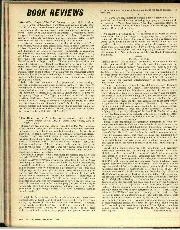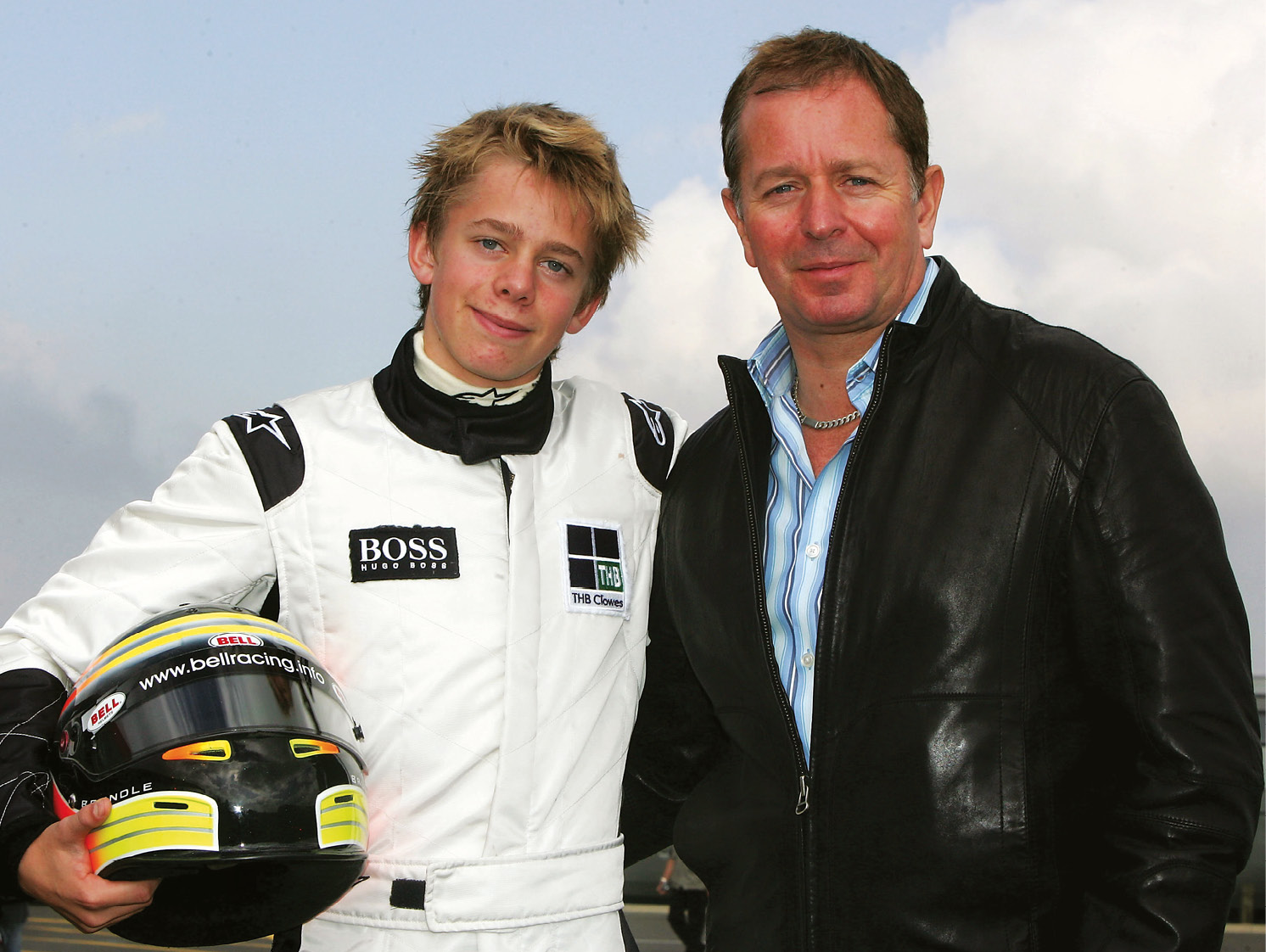
Book Reviews, February 1968, February 1968
"Grand Prix Bugatti," by H. G. Conway. 224 pp. 8 7/8 in. x 7¼ in. (G. T. Foulis & Co. Ltd., 1-5, Portpool Lane, London, E.C.1. 63s.) H. G. Conway…
It’s a testament to the longevity of Martin Brundle’s career that some may now know him better as an F1 commentator. But before that the multiple grand prix podium finisher – and key man to Jaguar’s 1990 Le Mans 24 Hours victory – enjoyed a formidable racing career. He’s now also looking after the career of his son Alex, who after climbing as far as Formula 2 has switched focus to sports car racing in the LMP2 division of the FIA World Endurance Championship and European Le Mans Series. It’s gone well so far, too, with two Le Mans podium finishes on his resumé.
Interviews by James Mills
Martin: “My parents had a modest small holding and one year the strawberries were put together into a sort of collective, shipped down to London and the money never showed up. Mum had always joked that Dad was more likely to be found fixing someone else’s tractor than working on the farm, and after the crop scandal that’s how he got started in the motor trade, fixing other peoples’ motorbikes. One of my earliest memories is sitting on the tank of his Ariel Square Four, when I was four or five.
By the time I was eight, there was an Austin A35 that was a write-off, sat at the back of Dad’s used car lot. I’d badger one of the mechanics to take my brother and I, who was probably five at the time, to a field where we’d charge round. It was harmless fun.
The first time I put Alex in a kart it ended up with him crashing and being flung across the track, lying prone on the ground. I rushed over, picked him up and shook him off and happily he was fine. We agreed we wouldn’t tell mum when we got home.
Liz, my wife, has had to endure both of us racing. Alex has never given us cause for concern, but sometimes I find myself thinking of that quote: “You can replace your husband but you can’t replace a son.”
My good fortune when I started racing was that we owned the family business, a garage, where I’d build my grasstrack race cars. Even so, I can remember nearly breaking the company in the late ’70s, when the taxman got upset that it put £25,000 into my Formula Ford 2000 season.
These days that platform of opportunity requires either massive wealth in the family or outstanding talent. Take the example of Lewis Hamilton. It’s often portrayed that he had a tough route to F1 but actually he had a magic-carpet ride. To navigate all the championships up to F1 without sponsorship you’ve got to have six million lying about.
I didn’t want to be Alex’s manager, and I said that to him. You can tell someone until you’re blue in the face that your son’s a great driver, but it counts for nothing; what else are you going to say about your son?
But we have achieved a lot together and it was a smart move to get into sports cars. He’s truly outstanding in a sports car. And the cars have moved on so much. I’ve driven an LMP2 car like his, and you have so much front-end grip. Whereas with a Jaguar Le Mans car, with a spool differential, you’d just be managing understeer.
When we raced together at Le Mans [in 2012], I loved every moment of it. I don’t know what could be more powerful as a father-son experience than sharing a car at Le Mans; handing the car to him in the middle of the night; making sure his belts were tight; giving him a quick brief on conditions out there; then sending him off into the night at the age of just 20!
“A lot of things I tell Alex are based on mistakes I made during my career”
I wasn’t worried about him. Even in initial testing, he was so fast. And his traffic management was outstanding. I was relaxed about him and more concerned about my physical fitness as a bloke in his early 50s.
A lot of things I tell Alex are based on mistakes I made in my career. Hopefully the advice I have been able to give him is to maximise opportunities and not get caught up in any sort of battle or emotion that is essentially wasted energy.
He’s had to cope with a lot of pressure, given he could be perceived as a lucky kid. Eyes have been on him all the way through the early part of his career. So he doesn’t need me adding to that pressure. You won’t find me wearing a headset in his garage at his races – I’m not a pushy dad.
When that awful moment came to step down from F1, I didn’t want to stop, so I filled my time with about four jobs to cope with the fact things were grinding to a halt. I was commentating for ITV; I started managing David Coulthard; I got involved with the Arrows F1 team; and I drove for Nissan at Le Mans. It hasn’t really let up since.
Like his sister Charlotte, Alex has a wise head on his shoulders, knows right from wrong and the value of a pound. So I don’t have any concerns about the next phases of their lives. How much time I’ll have to spend with them, on the other hand, is another matter. With 22 F1 races to attend nex t year, I’ll pretty much be flat out once again.”

Alex: “The first petrol-powered car I got was one of those Honda-powered off-road buggies. I was probably five or six, and this thing turned up in countless bits and pieces and Dad had to do the dutiful Dad thing, open up his tool box and set to work.
Dad appointed himself the chief test driver, and insisted on driving it before anyone else – just to make sure one of the wheels didn’t fall off, naturally – and was horrified at how fast it was! It was meant to only do 12mph, but it probably did 30mph.
Once I got a kart, a Comer Kadet, we’d pile everything into the car and head to North Pickenham, the local kart track. They had a couple of corporate karts there that were derestricted, so they would be able to keep up with my Kadet, and Dad would clamber in and follow me around, and we’d practice race craft together.
In the early stages of trying to climb the motor sport ladder, I had to take the mantle and thrust myself forward. I couldn’t afford to stand on the sidelines and let my career be an attribute of someone else’s life. I couldn’t be seen as ‘son of Martin Brundle’. I was the priority, my performance was the priority and I couldn’t be shy about that.
If Mum or Dad had been worried about me going racing, they never communicated it to me. You might think that Dad’s the one who lives and breathes motor racing, but Mum, too, is immersed in the world – it’s been her life since her early 20s.
She’s amazing. Mum barely missed a race until I was 26. That includes two years of the World Endurance Championship, with rounds in Fuji, Shanghai, Bahrain, Texas and Mexico. She’s Alex Brundle Racing Fanclub member number one, my sister’s number two; we’re a family that follows our calling.
Dad’s most valuable advice has been about how you deal with a big team of people. The reality is, his expertise in driving cars isn’t relevant. When I was in single-seaters, he hadn’t driven a junior series single-seater since the ’80s, so there was not much he could add.
However, management of media, dealing with sponsors, negotiating contracts, handling teams and their ambitions were areas that he could give wise counsel on. And of course, there were the introductions…
In the second part of Dad’s career, as a journalist and commentator, people behind the scenes of F1 might confide in him but he never shares any of it
People often say, ‘Surely it must be a massive leg-up to have a father with so many connections?’ but all a personal connection might help with is getting you in front of an individual; after that, you’re on your own.
Having all those connections is something that Dad is very private about. In the second part of his career, as a journalist and commentator, people behind the scenes of F1 might confide in him but he never shares any of it. He’s incredibly professional and guards his sources at all times.
Amusingly, though, people do muddle us up on the phone as we sound so alike. So if I am back at Mum and Dad’s and answer the phone, people might launch into a detailed conversation about F1 and I have to wait for them to pause for breath before I can tell them it’s Alex on the end of the line.
He’s still a competitive so-and-so. He’ll text me about a time he’s laid down on Gran Turismo, around the Nürburgring. It’s interesting to watch him on a racing simulator. He’ll hate me for saying this, but he drives in a classic grand prix way, a mechanically sympathetic style. Brake in a straight line; turn into the corner; clip the apex; smoothly feed in the power.
He doesn’t manage my career any more. Did he charge a fee or take a commission? There was never anything like that and to be honest if I had to pay the bloke for the hours that he’s put into me over the years, I’d be very, very worried about the bill! He’s been, and continues to be, endlessly helpful.
There have been stressful times – not every season and deal works out – but we’re a tough family, flat-out like worker bees.
Just look at Dad’s career. He’s busier than ever. He revels in it. I think it would be worse for his health to stop! He never, ever leaves home to go to an F1 event without being hugely excited. For me, that’s just fantastic.”
Follow James on Twitter @squarejames